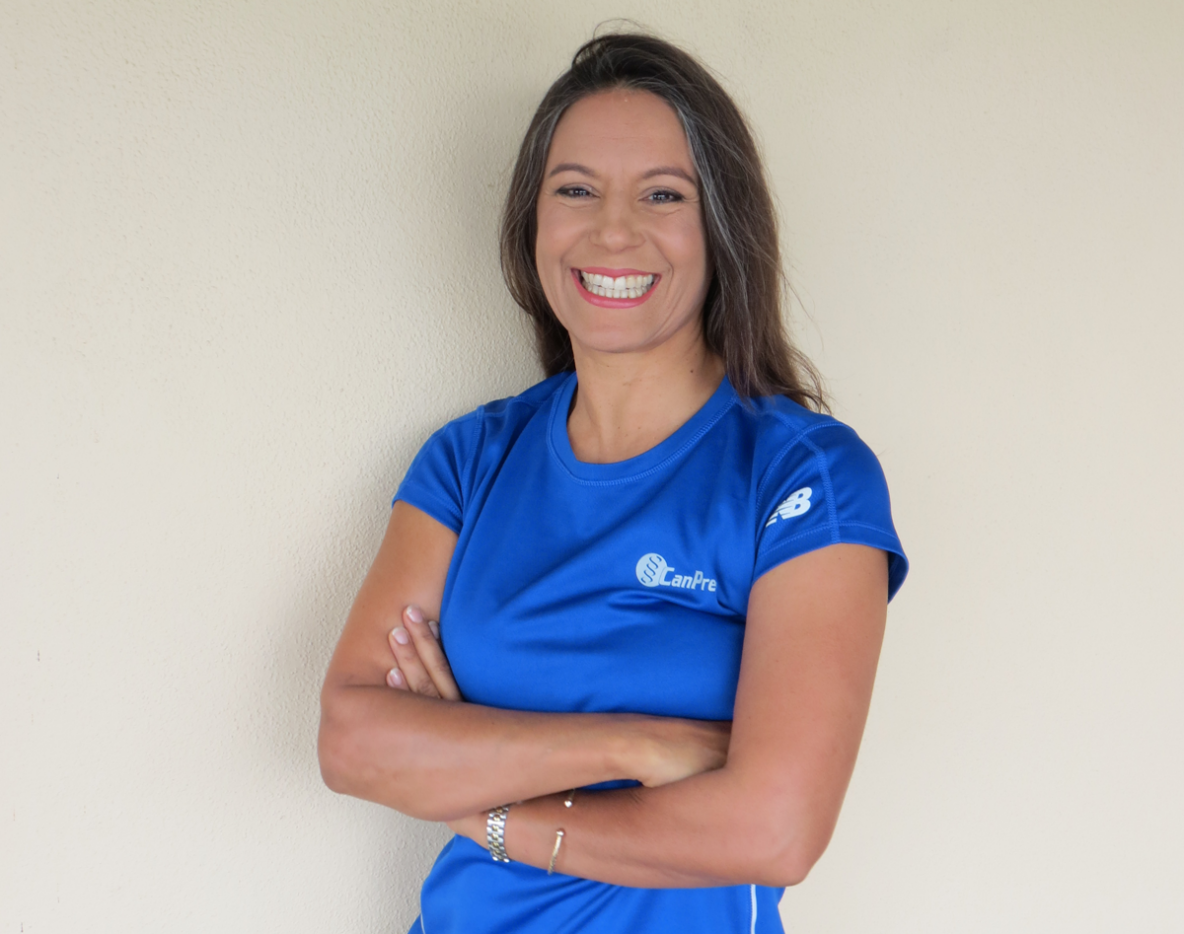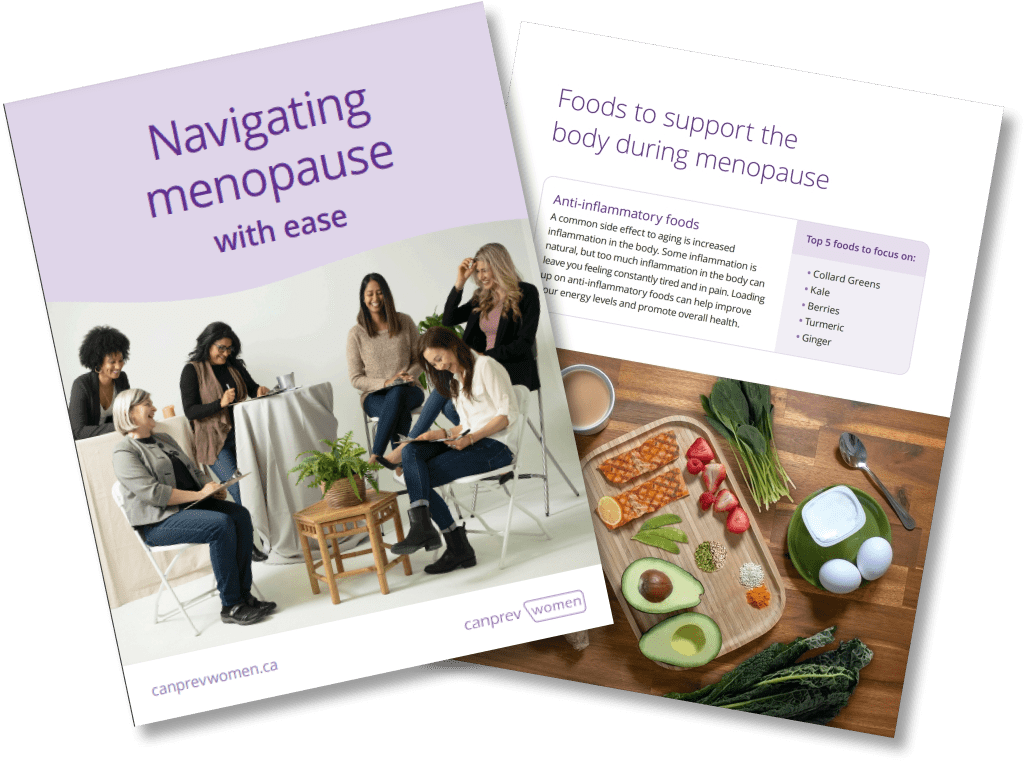Speaking up for yourself can be a tough and scary thing to do, especially when it comes to your health and wellbeing. Tanya Salituro, founder of CanPrev, mom of 4, and breast cancer survivor knows this all too well.
During an interview with The Tonic, Tanya speaks about her personal journey with battling cancer. As a young adult, putting herself first came naturally to Tanya. But as years went by, and she was happily married with little ones to care for, her instincts were a little different.
Check out the full interview below to learn more about Tanya’s inspiring story.
TT: What were the circumstances of your first diagnosis of cancer?
TS: I had felt the hard pea-sized lump a year and a half earlier and had lived with tolerable but stabbing pain for about 6 months as the nodule grew. Tolerable became intolerable and I asked to have the supposedly harmless (due to my young age) lump removed. The surgery was fairly quick and uncomplicated.
TT: What was your reaction to being told that you had breast cancer at age 21?
TS: My surgeon asked me to come in and I came alone thinking it was just removal of lumpectomy stitches. On hearing I needed further surgery, I went into shock and couldn’t speak. I ended up switching surgeons and the next surgeon “broke the news” that I had had a biopsy, though no one had used this word with me before. The pathology outcome was in fact breast cancer. This time silent tears of deep sadness and dread filled me – I was such a lover of life.
TT: What was the treatment that was recommended to you at that time and what did you do?
TS: First of all, they had not gotten all the cancer as the “margins were not clear” so I required more surgery and to have all my armpit lymph nodes (thirteen of them) removed to test for metastasis. This all would occur one month from the original surgery. After this second surgery and all the usual body scans and blood tests, thankfully, it was determined that there was no metastasis and I was likely cancer-free. My oncologist then recommended 25 rounds of radiation to the chest and armpit followed by chemotherapy and prescribed drugs the rest of my life to keep my estrogen in check and reduce my risk of recurrence (supposedly good news).
To me, this wasn’t good enough news. I knew I needed to find other measures to remain proactive— something that wouldn’t cause further stress on my body. And, for me that was natural therapies.
TT: So you decided to follow a natural approach to your health. What did you do?
TS: Yes, after much research (by interviewing cancer/chemo survivors) I decided against any prescription medications, but underwent the radiation; which took a great toll on my body and immune system. Next I went to see an iridologist, changed my diet, took a lighter course load at university and began supplemental antioxidants – which were hard to come by in 1991!
TT: But 11 years later you experienced pain in your breast again – having gone through your first diagnosis, did you anticipate that the cancer had returned?
TS: The unmistakable pain in the same location signaled to me that the cancer must be back.
TT: When you felt the pain again, did you act on it?
TS: I should’ve acted earlier but I was now married with a 2 year old and gratefully breast-feeding a baby (on the one breast that was able) so I waited until I was almost finished breast-feeding.
TT: Was it difficult to choose to prioritize your health at that point of your life?
TS: It wasn’t difficult, in that I wanted to put the needs of my baby first and knew the benefits of breastfeeding, but in hindsight I probably should have returned sooner to the surgeon and put life first.
TT: Were your feelings correct?
TS: Yes. However, the surgeon felt there was little chance of a recurrence after the intense radiation and a mammogram was inconclusive. I pushed my doctor for a biopsy. The biopsy’s pathology reported the same estrogen-positive cancer, a second time.
TT: What was the prognosis and treatment?
TS: Radiation of the same location was not allowed (good!), so I was to decide between a mastectomy, at age almost 34, or another lumpectomy; and either way to take chemo and drugs the rest of my life – which I refused once again. I opted for just a lumpectomy, now my third one.
TT: But then a year later, after your third lumpectomy you felt pain again. What happened next?
TS: The surgeon explained it was likely scar tissue forming or moving and then a mammogram showed no cancer or suspicious lumps. When I asked for further testing such as an MRI, I was refused because I was “low risk” at the time. “Keep an eye on it and come back in 6 months if it is still painful.” !!??
TT: So you had to wait 6 months for an MRI – how did that make you feel?
TS: I know my own body and was fully aware that I had cancer. However I had to allow the lump to grow big enough to be detected on a mammogram. So 6 months of pain and wondering if cancer was metastasizing at any moment seemed like an eternity. It was a time of suffering in solitude but humbling knowing all I could do was pray for the cancer not to spread.
TT: What drove the decision to have a mastectomy?
TS: I had been experiencing intermittent stabbing (debilitating when it hit) pain. The visit, 6 months later, found me feeling down and desperate about my health but still passionate for life. My husband was unbelievably supportive and said he just wanted me “to be well.” So I didn’t ask for an MRI this time but requested a mastectomy right away!
TT: Did you consider having chemotherapy at this point?
TS: Absolutely not, knowing there were growing natural options and having watched a friend (and mother of 2 babies) with breast cancer die after a full year of such treatments it wasn’t an option for me.
TT: So your experience led you down the path to natural health. Can you elaborate?
TS: The fact that I had been taken to a family homeopathic doctor in Germany as a child and witnessed miraculous healings from natural medicine steered me to the optimism I had for natural options. I just needed to find what would work for my situation.
TT: And your decision to start CanPrev was driven by your experience – what was your mission?
TS: There was a lot of frustration in not finding safe or effective natural products over years of trial and great investment. I needed a secure and therapeutic option. We started with the prayer to do something good for our family and good for the world. We ended with a company having the mottos, “You can prevent” and “Take ownership of your health”, Which is CanPrev today.
TT: You’re a firm believer in self-advocacy for health. What should Canadians understand about self-advocacy?
TS: Every person and every health issue is somewhat unique to your body, health history, and current circumstances. I’m grateful for all doctors but they don’t always have time or expertise in all options; so self-searching, self-belief, and self advocacy (ideally alongside the support of family, a friend, or a support network that works for you) is important.
TT: What are the necessary steps to self-advocacy (particularly for women)?
TS: Researching credible sources is advisable and getting second opinions is often needed. Always have written lists of your questions, possible alternatives, and take a supporter with you to appointments.
TT: What are the sources of information that you trust?
TS: The Canadian Cancer Society helped me a lot back then but today there are naturopathic doctors and many other sources which can help such as the Canadian Association of Naturopathic Doctors (cand.ca), Canadian College of Naturopathic Medicine Integrative Cancer Clinic (https://ccnmicc.ca/) which offers free weekly clinics to the public and the large Ottawa Integrative Health Centre (https://www.oihc.ca/). I also believe in having a holistic nutritionist on your team to guide your eating program.
TT: What are the key learnings for you given your health experience?
TS: I’ve learned far too many lessons to list but the key ones are about humility, appreciation for every day of life, the importance of faith and community support, giving back and, of course, taking ownership of your health.
TT: You have been cancer free since 2005. Do you think that your journey would be different now (given improvements to treatment)?
TS: I’ve had several friends recently diagnosed with breast cancer and some of them with no metastasis were not recommended radiation or recommended less often but more intense radiation. This is a good sign that doctors are customizing protocols more. Regarding natural (alternative and complementary) options… WOW so many options are cropping up – from our liquid and powdered vitamins to intravenous mistletoe and other vitamin injections, infrared saunas, raw diet, wifi-free clinics, and everything in between.
TT: Do you have any specific advice for women who have been diagnosed with cancer?
TS: Remember that every decision is yours to research and yours to make. Advice can be offered and secondary opinions and options from different types of doctors should be explored. I like the combination of complementary medicine which means taking the best combination of western, eastern and alternative medicine for each individual case (acknowledging that finances can be limiting).
TT: What advice do you have for women to maintain their health generally?
TS: Practically speaking, get your vitamin and hormone levels tested. Eat sugar-free (I like unpasteurized honey, stevia, xylitol or monk fruit). Take quality natural supplements to resolve deficiencies and share life, laughter and belief systems regularly with dear ones.
TT: What does self-care mean to you today (years removed from your health crisis)?
TS: Self-care means prioritizing your mental, physical and spiritual health. I’ve witnessed the connection between these and felt the positive health effects of adding more trust, joy and love into life. I’m also much more “chill” about what life throws at me, the daily challenges of a big family, community activities, friends, and a growing business. These require my attention but touching people personally with love, while striving for concrete goals is my highest priority. Love brings so much healing.
Making the decision to put yourself first can be really difficult, especially when you have others depending on you as well. But it’s important to remind yourself that feeling your best only helps you be there for those you love.
Listen to Tanya’s full interview here.


